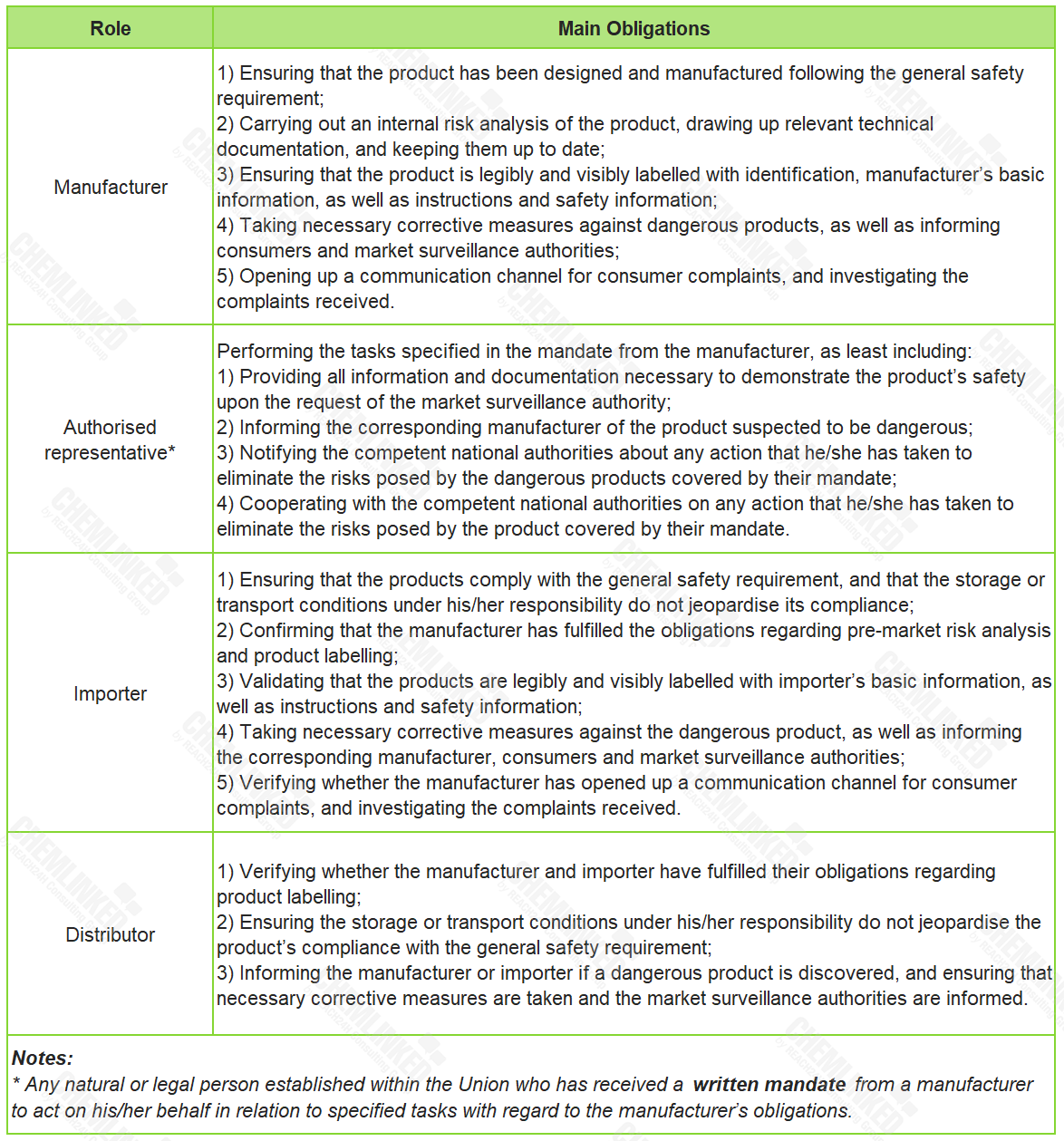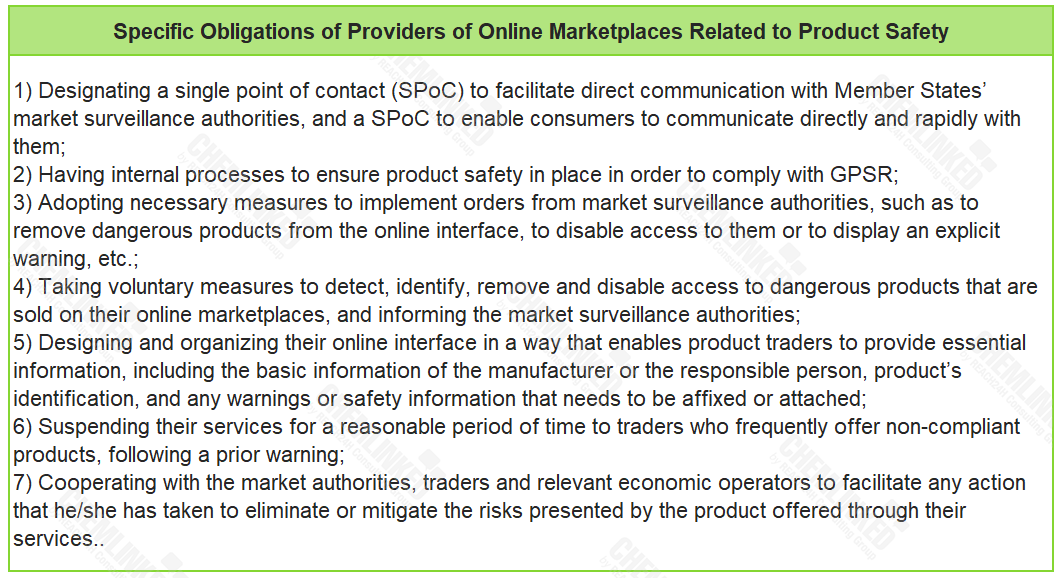공지/교육
법령
[Chemlinked] New EU Regulation on General Product Safety to Take Effect in 2024
첨부파일
등록일 2023-06-12
조회수 6572
The new regulation on general product safety specifies consumer products that are subject to its scope, and imposes general safety requirement for them, details the obligations of economic operators and providers of online marketplaces, and establishes a market surveillance network.
On May 23, 2023, EU published the new law Regulation (EU) 2023/988 on General Product Safety (GPSR) in its Official Journal, repealing Directive 87/357/EEC and Directive 2001/95/EC. This regulation aims to strengthen the protection of consumers while enhancing the functioning of the internal market. It will enter into force on June 12, 2023, with a transitional period of 18 months. From December 13, 2024, it shall be fully enforced in all Member States.1
Directive 87/357/EEC regulates non-food products that resemble food, which may be mistakenly ingested by consumers, endangering their health or safety. It was adopted at a time when the regulations for consumer product safety have very limited application scope. Directive 2001/95/EC specifies the safety requirement for consumer products and the responsibilities of market surveillance authorities of Member States. However, it needs to be revised to reflect the developments of new technologies and online selling. To clarify the regulatory framework for consumer products and align the market surveillance on them across the Union, the new regulation GPSR was stipulated to replace the previous directives. This article introduces the highlights of the regulation.
1. Specifying GPSR's application scope
GPSR applies to products that are placed or made available on the market, provided that there are no specific provisions with the same objective under Union law which regulate the safety of the products concerned. Where products are subject to any other specific safety requirements, GPSR applies only to aspects and risks or categories of risks which are not covered by those requirements.
To avoid overlapping provisions and ensure a clear legal framework, Article 2 of GPSR prescribes that the following products are excluded from the scope of this regulation, due to they are subject to specific legal frameworks that take into consideration their specificities:
- Medicinal products for human or veterinary use;
- Food and feed products;
- Living plants and animals, genetically modified organisms, genetically modified microorganisms in contained use, as well as products of plants and animals relating directly to their future reproduction;
- Animal by-products and derived products;
- Plant protection products;
- Equipment, on which consumers ride or travel, directly operated by a service provider within the context of a transport service;
- Aircraft referred to in Article 2(3), point (d) of Regulation (EU) 2018/1139;
- Antiques.
2. Imposing the general safety requirement for consumer products
Article 5 of GPSR lays down the general safety requirement for applicable consumer products, stipulating that economic operators shall place or make available only safe products on the market. This requirement should be primarily achieved through the product's essence and design, taking into account the intended and foreseeable conditions of use. When assessing product safety, all relevant aspects should be considered, in particular
- the physical and chemical characteristics, appearance, and presentation (product labelling, or any warnings and instructions for its safe use and disposal) of the product;
- the categories of consumers using the product;
- the effect on other products, and the effect that other products might have on the product concerned;
- the health risk posed by digitally-connected products, including the risk to mental health.
The regulation clarifies that, the mere fact that a product could be made even safer, or that there are less risky products available should not be the sole criteria for determining whether a product is dangerous or not. Other factors should also be considered. Moreover, during the safety assessment, it is important to take into account that the need for the product to be safe over its entire lifespan.
3. Detailing the obligations of economic operators
An economic operator is a natural or legal person who has obligations related to the manufacturing or distribution of products on the market. To fulfil the general safety requirement of GPSR, it is necessary to establish a clear and proportionate assignment of obligations that correspond to the role of each operator in the supply and distribution process. Accordingly, GPSR outlines the obligations of the main economic operators as follows:

Given the consistent and steady growth of online selling, new challenges have arisen with respect to ensuring product safety. In response, GPSR specifies economic operators' obligations in distance selling, which includes the sale of products online. Where economic operators make products available online or through other means of distance sales, they shall clearly indicate the basic information of the manufacturer or the responsible person, the product's identification, and any warnings or safety information that needs to be affixed or attached.
4. Emphasizing the responsibilities of online marketplace providers
The development of online selling has also created new market actors, such as the providers of online marketplaces. These entities play a crucial role in the supply chain by enabling economic operators to reach a greater number of consumers. Due to the importance of their role, GPSR assigns them specific requirements to effectively tackle the sale of dangerous products online.
It is worth mentioning that, if an entity only provides an online selling platform for a product, it is considered a provider of an online marketplace for that product. However, if the entity also acts as an economic operator listed above, he/she is considered both the online marketplace provider and the relevant economic operator, and shall also comply with the obligations applicable to the economic operator concerned.

5. Establishing a network for market surveillance
Ensuring cooperation between all economic operators and providers of online marketplaces with market surveillance authorities is crucial to mitigating and eliminating risks of products made available on the market. The requests made to economic operators and online marketplace providers by surveillance authorities should be tailored to their role in the supply chain and their respective legal obligations. In view of this, GPSR sets up a market surveillance network, Safety Gate, to optimize the previous Rapid Exchange of Information System (RAPEX).
Safety Gate comprises three elements, specifically:
- Safety Gate Rapid Alert System: an internal system through which authorities and the Commission exchange information on measures concerning dangerous products;
- Safety Gate Portal: a web portal to inform the public about dangerous products, and enable them to submit complaints;
- Safety Business Gateway: a web portal to enable businesses to inform market surveillance authorities of the Member States about dangerous products and accidents.
To further streamline the operation of this network, GPSR requires the Commission to develop interfaces between different Safety Gate elements. Specifically, the Commission must provide technical solutions to ensure that the information submitted by businesses on the Safety Business Gateway, which is meant to alert consumers, can be made available to consumers on the Safety Gate Portal without undue delay. Additionally, the Commission must develop an interoperable interface that allows providers of online marketplaces to link their interfaces to the Safety Gate Portal by December 13, 2024.
Further Reading
- EU Adopts the 12th Revision of The SCCS Notes of Guidance for the Testing of Cosmetic Ingredients and Their Safety Evaluation
- EU to Amend the Use Requirements for 13 Nanomaterials in Cosmetics
Reference Links
출처 : Chemlinked








